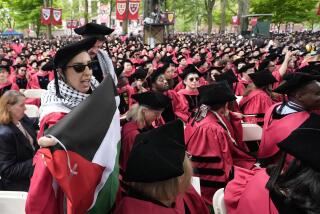Bush May Not Be a Good Student, but He’s a Good Leader
- Share via
On one of the last weekends before election day, George W. Bush decided to campaign in Florida rather than attend his Harvard Business School 25th reunion. It didn’t take a Harvard MBA to figure out that decision. Yet the training at Harvard will clearly have an impact on how he will perform in his new CEO position. In fact, Bush’s big-picture, highly delegative management style reflects much of what he was taught on the south bank of Boston’s Charles River.
As someone who went through the same program 16 years later, I think Bush’s Harvard schooling has made him a better manager and leader. But B-School also may have reinforced some of his natural instincts, which might not be constructive as president. In particular, it is crucial that he find the right balance, delegating prudently without becoming too isolated from the details of governing.
Bush’s managerial style will be monitored more closely than that of most new presidents. Yet, while Bush’s leadership approach has received great scrutiny, the fact that he will be the first MBA to rise to America’s top boardroom is rarely mentioned. That is in part because Bush himself rarely speaks about it. Harvard B-School’s influence on him is also overlooked because there is some public confusion over what is taught there.
Harvard is viewed by many as a Wall Street finishing school, yet it actually emphasizes general management training with as much focus on qualitative as quantitative skills. After analyzing and debating 1,000 case studies, Harvard graduates leave campus with more process than content. It is a generalist, broad-based education that is easily transferable to government administration. In fact, B-School probably has been more useful to Bush in politics than in either the oil or baseball businesses. And its non-ideological, pragmatic approach is well suited to the contentious political situation Bush now faces.
According to those who knew him there, the elements of Bush’s managerial model were in place when he got to campus in the fall of 1973, but his experience at Harvard helped hone them. An informal survey taken by one of his classmates at the 25th reunion put Bush in the bottom third of his class academically. But fellow students and professors I interviewed say he displayed strong leadership skills in team business simulation exercises and even as point guard of his top intramural basketball squad. Bush may not have been the best or the brightest, but he had the rare ability to gain the trust of and lead those who were.
From the beginning, classmates say it was Bush’s unusual confidence that stood out. On the first day, almost everyone--even those students just back from military service in Vietnam--were nervous about performing in the intense case-method format. Yet Bush appeared quite relaxed, even chewing tobacco in the classroom’s back row.
As he prepares to take control of the world’s biggest corporation, Bush should reexamine a couple of the things he took away from Harvard a quarter century ago.
At Harvard, students are taught to delegate responsibility to avoid getting bogged down in managerial minutia. That idea is well illustrated by Rep. Christopher Cox (R-Newport Beach), who was a year behind Bush at Harvard and later became a professor there. One of Cox’s students left his tax exam blank, adding a note explaining that he would hire the top expert in the field to figure out the complex problem. Cox failed him for applying the right concept at the wrong time.
MBA’s are instructed to avoid sweating all the details, not because they’re not important but because you may not have time to learn them. Clearly, Bush will attract excellent people to sweat for him. Yet he must remember that Harvard did teach him to sweat some of the details, if only in order to keep on top of his operation and provide oversight to his own advisors. You don’t want to be scheduling the White House tennis court, but you also can’t become so removed that Iran-Contra is planned out of the building’s basement.
MBA’s must think efficiently, but not too efficiently. The MBA program discourages extraneous thought because students don’t have time to focus on anything but the cases at hand. For most students, that disciplined, narrow focus helps streamline their decision-making process. But as Bush was already a quick study, he could have used a nudge in the other direction. Harvard may have reinforced his natural inclination to learn only what was absolutely necessary.
Many presidential judgments are black and white, requiring decisive leadership. Yet there are a number of key questions facing the nation at the dawn of the 21st century that are more gray and complex, calling for more nuance and deliberation. Over a four- or eight-year term in a dynamically changing world, a president should want to engage in some basic research and thinking if only to recharge himself.
Bush is self-admittedly not an intellectually curious person. Sometimes he seems a little too proud of his lack of knowledge. It appears that he doesn’t read beyond the executive summary, less for efficiency than lack of interest. The exception seems to be on the issue of education, where he seems to embrace research and complexity. It is--not coincidentally--the policy area where Bush is viewed to have been most successful.
More to Read
Get the L.A. Times Politics newsletter
Deeply reported insights into legislation, politics and policy from Sacramento, Washington and beyond. In your inbox twice per week.
You may occasionally receive promotional content from the Los Angeles Times.










